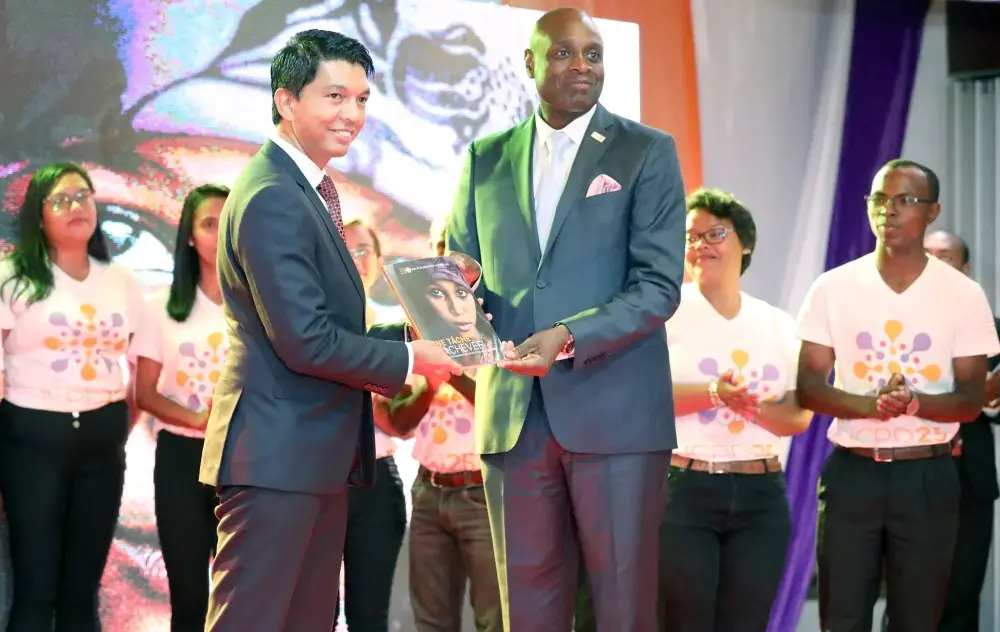NAIROBI, Kenya—The Nairobi Summit on ICPD25 resulted in a resounding commitment to accelerate the promise of the International Conference on Population and Development (ICPD), said Dr. Julitta Onabanjo, UNFPA Regional Director for East and Southern Africa. “This is a great testament to the importance of the work that lies ahead of us, globally and in East and Southern Africa,” she said.
Instead of just talking about rights, action was taken at the radically inclusive conference to uphold them. More than 9,500 delegates from 170 countries united behind the Nairobi Statement, which establishes a shared agenda to complete the ICPD Programme of Action. The participants did the work needed to put a brighter future within reach for generations to come.
It’s now time to finish that unfinished business.
“It’s now time to finish that unfinished business. If we don’t make the right investments in education, protect and provide her with sex and reproductive health and ensure that she has work opportunities, a teen mother in 2019 can expect that some of the disparities she suffers will be just like the ones her children will encounter in 2030,” said Dr. Onabanjo.
“There will be no ICPD50. Women and girls around the world have waited long to have rights and choices,” agreed Ambassador Ib Petersen, Denmark’s special envoy for ICPD25.
More than 100 sessions were held, in line with UNFPA’s transformative results of zero maternal death, zero unmet need for family planning, zero gender-based violence and harmful practices and, in East and Southern Africa, zero sexual transmission of HIV.
Towards better menstrual health management throughout the reproductive life course
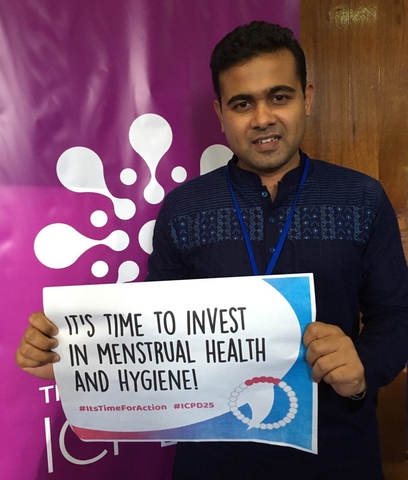
in menstrual health and hygiene management advocacy,
participants at the menstrual health session agreed.
© UNFPA ESARO
The session on “Menstrual health and vaginal bleeding throughout the reproductive life course” was a follow-up to Africa’s first-ever menstrual health symposium, held jointly by UNFPA and the Government of South Africa in Johannesburg, South Africa in May 2018.
Key themes discussed in this session included vaginal bleeding throughout the reproductive life course, vaginal bleeding and menopause-related stigma and discrimination, and community engagement and leadership for gender-transformative menstrual health management.
Recommendations included:
- There is a need for inclusive programmes that leave no one behind.
- Existing structures and community leaders should be used to strengthen the implementation of culturally appropriate, homegrown solutions for gender-transformative responses to MHM-related issues and challenges.
- There is an urgent need to involve males and young people in menstrual health and hygiene management advocacy.
Call for climate change adaptation and justice
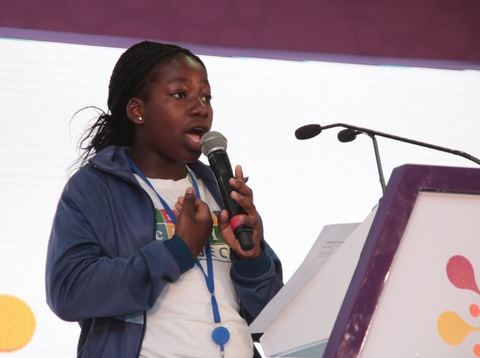
Khayelitsha, South Africa, describing her fight for climate justice.
© Nairobi Summit
Climate change disproportionately affects populations in the Global South, despite their lower contribution to the root causes of this global crisis. This key session on “Climate Change Adaptation and Justice” was moderated by Lattanya Mapp, President and CEO of the Global Fund for Women.
As prevention and adaptation efforts are progressing too slowly, young people across the globe are stepping up to the challenge by speaking out against climate change, as well as educating and mobilizing their communities. Twelve-year-old climate change activist Yola Mgogwana, from South Africa, and Chiagozie Udeh, from Nigeria, spoke of how all our actions have an impact on our planet. Chiagozie described how his afforestation campaign of a Trillion Trees aims to reduce carbon emissions by 25 per cent in 2030.
urged Baroness Sugg, Parliamentary Under-Secretary of State at the
Department for International Development’s UK Aid.
© Nairobi Summit
Greater action for combating climate change and its impacts was called for by Baroness Sugg, Parliamentary Under-Secretary of State at the Department for International Development’s UK Aid; Antigua and Barbuda Prime Minister, Gaston Browne; Ibrahim Thaiaw, UN Under-Secretary; and Yolanda Joab Mobi, Director of Island Pride.
The session was unique in that it brought together national leaders and young climate change activists to discuss the negative effects of climate change on entire populations and the impact of extreme weather conditions, rising sea levels, desertification, floods, drought, and shifting wildlife and habitats on the environment and people.
A speaker who wowed the audience was twelve-year-old climate change activist Yola Mgogwana from Khayelitsha, South Africa: “Three times this year I have marched to Parliament with school children from all over the world to demand climate justice but despite our hoarse voices, I knew our fight wasn’t over," she said. She described her mission to ensure that climate change is recognized.
Recommendations included:
- Affordable, scalable solutions will enable countries to leapfrog to cleaner, low-carbon economies.
- Climate change does not respect national borders; it is a global challenge that needs to be coordinated at an international level.
Men and boys’ rights to sexual and reproductive health
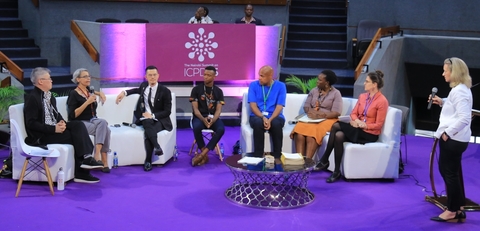
their sexual and reproductive health and rights can be addressed.
© Nairobi Summit
The session “Men and boys’ rights to sexual and reproductive health”, moderated by Justine Coulson, UNFPA Deputy Regional Director for East and Southern Africa, enabled reflection on the role of men and boys as clients, partners and agents of change for gender equality.
Opened by Queen 'Masenate Mohato Bereng Seeiso of Lesotho, the session explored how men and boys’ needs in terms of their sexual and reproductive health and rights can be addressed, as well as the social norms that need to transformed in order to enable this change. The need for working with men and boys to confront patriarchal notions of being a male, as the root cause of gender inequality, was the focus of Vitaly Djuma, Margaret Gream, Trevor Oahile.
“The bold, rights-based vision of the ICPD – that development must put people first, and attention must be paid to strengthening equal access to health, education and dignity for all persons – anticipated the bold, ambitious vision of the 2030 Agenda,” said Amina Mohammed, United Nations Deputy Secretary-General.
As critical accelerators for the Sustainable Development Goals, the outcomes of the ICPD must be carried forward.
“As critical accelerators for the Sustainable Development Goals, the outcomes of the ICPD must be carried forward. The success of the global agenda for sustainable development – our common framework for people, planet, prosperity, peace and partnership – depends on it.”
HIV: unfinished business for those most left behind
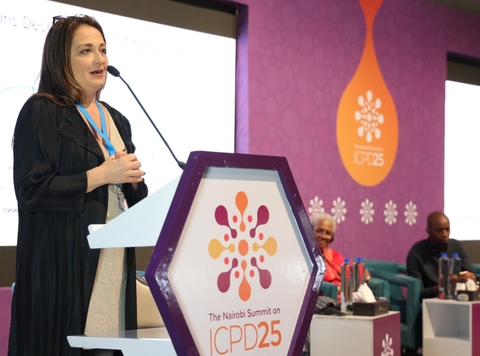
at the top, recognizing that the highest burden remains among key
populations. © Nairobi Summit
A collective call was made to lead, find new ways of doing things, and follow through on ideas and innovative ways of changing the trajectory of the epidemic, during the session on “HIV: unfinished business for those most left behind”. The Global Fund announced an unprecedented US$14 billion towards the elimination of HIV.
Policy makers and duty bearers have the most responsibility in ensuring that systems work for all – be it in accessing health care, education and information, as well as providing a protective environment for those most left behind, including youth in their diversities and girls and young women.
Addressing the sexual and reproductive health and rights (SRHR) needs of sex workers would avert the spread of HIV by up to 46 per cent, UNAIDS noted. There is a need to consider adolescents and young people’s right to information as this has been proven to work in reducing the spread of HIV, as significant progress is noted among adolescents who have their SRHR needs addressed.
HIV may no longer be a global threat to all, but we need to make it a threat to none.
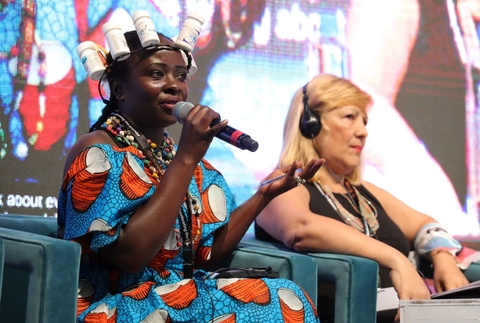
gender-based violence, which led to her contracting HIV and
becoming pregnant as a teenager. © Nairobi Summit
“HIV may no longer be a global threat to all, but we need to make it a threat to none,” said Dr. Shannon Hadder of UNAIDS. She called for political will and leadership at the top, recognizing that the highest burden remains among key populations. Health, safety, empowerment, equality and justice together ensure a supportive environment for populations that are most in need of protecting.
Stigma and discrimination, particularly for key populations, remains the fundamental challenge in the fight against HIV. The role of family and community as a whole was highlighted by Ugandan activist Barbara Kamigisa, who spoke about sexual and gender-based violence leading to her contracting HIV and pregnancy as a teenager.
We can’t wait for another young person to commit suicide or die.
“We can’t wait for another young person to commit suicide or die,” she said. Society has a role in breaking the silence around sGBV and starting much-needed conversations on stigma.
Putting young people at the centre of global HIV and SRHR response to achieve UHC
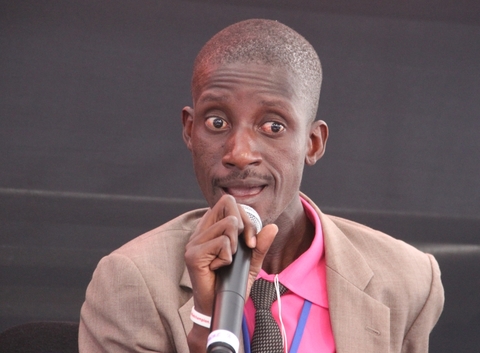
Hassan Zilakulabe, a young man from Uganda with cerebral palsy.
© Nairobi Summit
Young people in East and Southern Africa, especially adolescent girls and young women, have not fully benefited from past efforts to prevent new HIV infections and sexually transmitted infections (STIs) in Africa.
A session on “Young people at the centre of global HIV and SRHR response to achieve UHC” brought together a panel of young people, policy makers and programmers to discuss whether Universal Health Coverage (UHC) can be achieved without addressing the SRHR needs of young people.
Nicolas Boswane, a youth advocate from the Democratic Republic of the Congo (DRC), spoke of the impact of conflict and how the perpetration of violence leads to sexual and gender-based violence, which affects young people the most.
Hassan Zilakulabe, a young man from Uganda with cerebral palsy, addressed the needs of young people with disabilities, how they remain the furthest behind and are missing in sexual and reproductive health (SRH) programming.
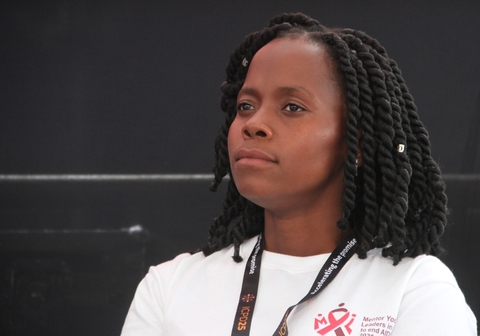
a 23-year-old woman from Eswatini who has lived with HIV for the
past eight years. © Nairobi Summit
Ayanda Dlamini, a 23-year-old woman from Eswatini who has lived with HIV for the past eight years, focused on the stigma faced by and labelling of young people with HIV, and the everyday challenge of being different in a changing world.
The responding panellists included Kgalema Motlanthe, former South African President and HIV-free generation champion. He called for leaders to shift the thinking around young people and to ensure that young people’s SRH needs are addressed within their contexts.
Participants called for accountability to young people, the need to shift away from traditional thinking, and to create spaces where young people can have uncomfortable conversations leading to solutions that prevent new infections of HIV.
- Nancy Onyango and Edwinah Orowe



